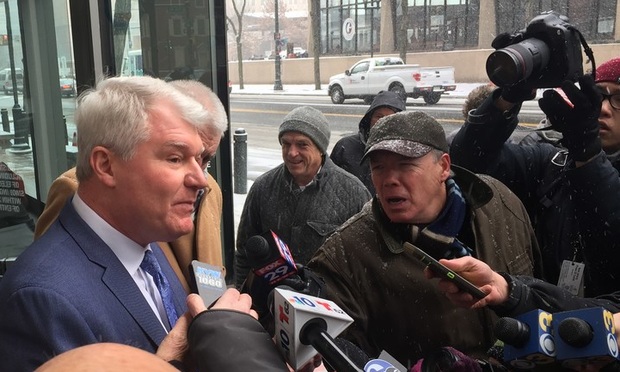Judge Ordered to Reconsider Motion to Stay Civil Suit Against 'Johnny Doc' Pending Criminal Case
In a case of first impression, the Pennsylvania Superior Court adopted a six-factor test established by the federal courts for determining whether to stay a civil case pending resolution of a related criminal matter.
March 18, 2020 at 01:21 PM
6 minute read
 John Dougherty addresses reporters outside the courthouse following his arraignment, Feb. 1, 2019. (Photo: P.J. D'Annunzio/ALM)
John Dougherty addresses reporters outside the courthouse following his arraignment, Feb. 1, 2019. (Photo: P.J. D'Annunzio/ALM)
In a case of first impression, the Pennsylvania Superior Court has ruled that a Philadelphia trial judge must reconsider her refusal to stay a civil lawsuit brought by a nonunion electrical contractor against indicted union boss John "Johnny Doc" Dougherty, the International Brotherhood of Electrical Workers Local Union 98 and several Local 98 members.
In doing so, the appeals court adopted a six-factor test established by the federal courts for determining whether to stay a civil case pending resolution of a related criminal matter.
In Keesee v. Dougherty, a three-judge Superior Court panel unanimously reversed a decision by Philadelphia Court of Common Pleas Judge Shelley Robins New denying the defendants' motion to stay the proceedings and remanded the case for further consideration.
Plaintiff Joshua Keesee, the owner and president of nonunion electrical contractor MCON Electric, filed suit against the Dougherty, IBEW 98 and union members Christopher Owens, Thomas Rodriguez and Niko Rodriguez, alleging the defendants physically attacked him, causing him to suffer a broken nose, concussion and other injuries after Keesee's company was hired for a townhome project and he refused to join the union, according to the appeals court's March 16 precedential opinion.
Keesee's amended complaint alleges causes of action for battery, intentional interference with contractual relations, concerted tortious action and civil conspiracy. On Nov. 30, 2017, the trial judge overruled the defendants' preliminary objections, but on April 13, 2018, in light of news reports that Dougherty was the subject of state and federal criminal investigations, the defendants sought to stay Keesee's case, arguing that the civil litigation would imperil their constitutional right against self-incrimination.
New refused to issue a stay. Dougherty was indicted by federal authorities in January 2019, along with City Councilman Bobby Henon and six others, on 116 counts for allegedly conspiring to funnel union money into a personal "slush fund" for Dougherty.
In its March 16 opinion, the Superior Court panel consisting of Judges Mary Jane Bowes, Judith Ference Olson and Victor Stabile said the trial judge failed to adequately consider the six-factor balancing test established by the U.S. District Court for the Eastern District of Pennsylvania in In re Adelphia Communications Securities Litigation.
Olson, writing for the appeals panel, said that, as a threshold matter, the Superior Court did have jurisdiction over the defendants' appeal from New's order denying the stay.
Olson cited the Superior Court's 2014 opinion in Spanier v. Freeh, in which the court order held that denying a motion to stay is generally interlocutory unless it satisfies the three-pronged collateral order doctrine.
Olson said the court did have jurisdiction over the appeal in Keesee because the stay issue could be decided without reaching the merits of the plaintiffs' claims; it involves the Fifth Amendment right against self-incrimination; and the defendants' right against self-incrimination would be irrevocably lost if review were delayed until after a final judgment.
Turning to the Adelphia test, Olson said that while the state Supreme Court has never explicitly adopted it, the Superior Court did acknowledge the test in the Spanier case.
The Adelphia test requires courts considering a stay of a civil suit in light of a pending related criminal matter to examine: "(1) the extent to which the issues in the civil and criminal cases overlap; (2) the status of the criminal proceedings, including whether any defendants have been indicted; (3) the plaintiff's interests in expeditious civil proceedings weighed against the prejudice to the plaintiff caused by the delay; (4) the burden on the defendants; (5) the interests of the court; and (6) the public interest."
Olson said the Adelphia test was supported by the four factors laid out by the state Supreme Court in the 1983 case Pennsylvania Public Utility Commission v. Process Gas Consumers, which dealt with stays pending appeal. In Process Gas, the justices said a stay should be granted if "1. The petitioner makes a strong showing that he is likely to prevail on the merits. 2. The petitioner has shown that without the requested relief, he will suffer irreparable injury. 3. The issuance of a stay will not substantially harm other interested parties in the proceedings. 4. The issuance of a stay will not adversely affect the public interest."
Olson said New erred by only considering the first Adelphia factor in determining that the defendants had based their motion to stay on "'inadmissible and double hearsay evidence'" in the form of newspaper articles that said Dougherty was under investigation but gave no details as to specific criminal charges.
"This analysis of only the first of the Adelphia factors did not adequately accommodate, acknowledge, or permit vindication of appellants' constitutional rights," Olson said. "Therefore, we find it was an abuse of discretion for the trial court not to weigh all six of the Adelphia factors, at a minimum, before deciding to deny the motion to stay."
"On remand," Olson continued, "the trial court shall consider the indictments now filed against appellants, together with all additional facts and arguments offered by the parties, in addressing the [Process] Gas factors, as augmented by the decision in Adelphia."
Counsel for the defendants, Frederick Santarelli of Elliott Greenleaf, said the adoption of the Adelphia test was "new ground for the state courts" and will provide needed guidance for trial courts going forward.
Santarelli said its his view that Keesee's lawsuit is "an improper effort to exploit ongoing criminal proceedings" and to "abuse" his clients' Fifth Amendment rights.
"The Superior Court has reinforced the importance of the Fifth Amendment as a constitutional cornerstone," he said.
Counsel for the plaintiffs, Clifford Haines of Haines & Associates, said of the Superior Court's ruling, "It has always been our position Mr. Keesee should be the primary concern of the court system and not this defendant [Dougherty]."
"[Dougherty] created his own problems, not of our doing, and we have every right to proceed," Haines said. "The fact that he doesn't want to tell anybody what happened is his problem and not ours, but we'll see how the courts handle it going forward."
This content has been archived. It is available through our partners, LexisNexis® and Bloomberg Law.
To view this content, please continue to their sites.
Not a Lexis Subscriber?
Subscribe Now
Not a Bloomberg Law Subscriber?
Subscribe Now
NOT FOR REPRINT
© 2025 ALM Global, LLC, All Rights Reserved. Request academic re-use from www.copyright.com. All other uses, submit a request to [email protected]. For more information visit Asset & Logo Licensing.
You Might Like
View All

Am Law 100 Lateral Partner Hiring Rose in 2024: Report


Law Firms Mentioned
Trending Stories
- 1Uber Files RICO Suit Against Plaintiff-Side Firms Alleging Fraudulent Injury Claims
- 2The Law Firm Disrupted: Scrutinizing the Elephant More Than the Mouse
- 3Inherent Diminished Value Damages Unavailable to 3rd-Party Claimants, Court Says
- 4Pa. Defense Firm Sued by Client Over Ex-Eagles Player's $43.5M Med Mal Win
- 5Losses Mount at Morris Manning, but Departing Ex-Chair Stays Bullish About His Old Firm's Future
Who Got The Work
J. Brugh Lower of Gibbons has entered an appearance for industrial equipment supplier Devco Corporation in a pending trademark infringement lawsuit. The suit, accusing the defendant of selling knock-off Graco products, was filed Dec. 18 in New Jersey District Court by Rivkin Radler on behalf of Graco Inc. and Graco Minnesota. The case, assigned to U.S. District Judge Zahid N. Quraishi, is 3:24-cv-11294, Graco Inc. et al v. Devco Corporation.
Who Got The Work
Rebecca Maller-Stein and Kent A. Yalowitz of Arnold & Porter Kaye Scholer have entered their appearances for Hanaco Venture Capital and its executives, Lior Prosor and David Frankel, in a pending securities lawsuit. The action, filed on Dec. 24 in New York Southern District Court by Zell, Aron & Co. on behalf of Goldeneye Advisors, accuses the defendants of negligently and fraudulently managing the plaintiff's $1 million investment. The case, assigned to U.S. District Judge Vernon S. Broderick, is 1:24-cv-09918, Goldeneye Advisors, LLC v. Hanaco Venture Capital, Ltd. et al.
Who Got The Work
Attorneys from A&O Shearman has stepped in as defense counsel for Toronto-Dominion Bank and other defendants in a pending securities class action. The suit, filed Dec. 11 in New York Southern District Court by Bleichmar Fonti & Auld, accuses the defendants of concealing the bank's 'pervasive' deficiencies in regards to its compliance with the Bank Secrecy Act and the quality of its anti-money laundering controls. The case, assigned to U.S. District Judge Arun Subramanian, is 1:24-cv-09445, Gonzalez v. The Toronto-Dominion Bank et al.
Who Got The Work
Crown Castle International, a Pennsylvania company providing shared communications infrastructure, has turned to Luke D. Wolf of Gordon Rees Scully Mansukhani to fend off a pending breach-of-contract lawsuit. The court action, filed Nov. 25 in Michigan Eastern District Court by Hooper Hathaway PC on behalf of The Town Residences LLC, accuses Crown Castle of failing to transfer approximately $30,000 in utility payments from T-Mobile in breach of a roof-top lease and assignment agreement. The case, assigned to U.S. District Judge Susan K. Declercq, is 2:24-cv-13131, The Town Residences LLC v. T-Mobile US, Inc. et al.
Who Got The Work
Wilfred P. Coronato and Daniel M. Schwartz of McCarter & English have stepped in as defense counsel to Electrolux Home Products Inc. in a pending product liability lawsuit. The court action, filed Nov. 26 in New York Eastern District Court by Poulos Lopiccolo PC and Nagel Rice LLP on behalf of David Stern, alleges that the defendant's refrigerators’ drawers and shelving repeatedly break and fall apart within months after purchase. The case, assigned to U.S. District Judge Joan M. Azrack, is 2:24-cv-08204, Stern v. Electrolux Home Products, Inc.
Featured Firms
Law Offices of Gary Martin Hays & Associates, P.C.
(470) 294-1674
Law Offices of Mark E. Salomone
(857) 444-6468
Smith & Hassler
(713) 739-1250





